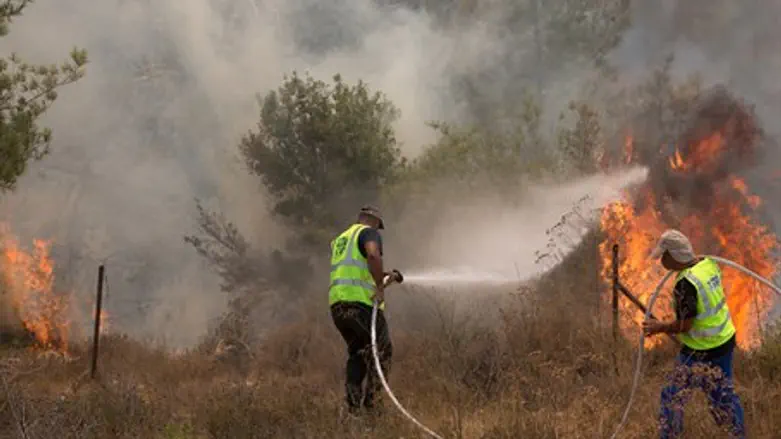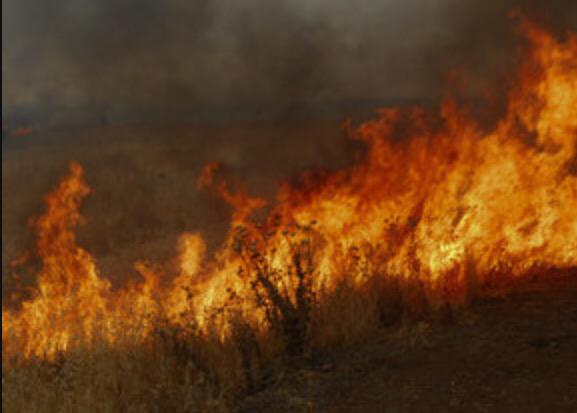
Despite a change in the wind, firefighters have still not gotten control of the major blaze outside Jerusalem. With that, officials said that the danger to towns near Even Sapir, where the blaze apparently broke out, has lessened.
That includes Haddasah Ein-Kerem Hospital, said Udi Gal, a spokesperson for the Jerusalem district fire department. “There is no immediate danger now to the hospital, but we are keeping a close eye on the situation.” At least 50 firefighting crews were battling the blaze.
Investigators said they are determined to discover the cause of the blaze, with one official telling Arutz Sheva that “all possibilities will be taken into consideration.” In a major blaze in the Gush Etzion Forest in June, investigators determined that Arab arsonists had set a fire as part of an ongoing “fire intifada.”
With that, sources in the fire department said that they were “strongly suspicious” that arson was involved. Speaking to Channel Ten, a fire department source said that the fact that the blaze broke out in Even Sapir – which has an industrial zone where several lumber warehouses are located – was “possibly not a coincidence.”
At least three firefighters have been injured so far, victims of smoke inhalation. One home in Even Sapir burned down, and the rest of the town has been evacuated. Rescue officials are preparing to evacuate other areas as well. Among the structures that have gone up in flames are old warehouses with asbestos roofs. A combination of the asbestos fumes and the smoke from the fire has caused a precipitous drop in the air quality in and around Jerusalem, and officials are urging elderly and ill individuals to take cover.
There was at least some good news Sunday: A separate fire that had broken out north of Jerusalem was brought under control. Soldiers at the Ofer Military Base north of Jerusalem who had been evacuated have returned to their posts.
Negligence or terrorism?
Investigators said they are determined to discover the cause of the blaze, with one official telling Arutz Sheva that “all possibilities will be taken into consideration.”
A similar set of fires tore through the hills south of Jerusalem last week, particularly near the Beit Shemesh area.
On Sunday, Shlomi Saadoun, a fireman from the Beit Shemesh Fire Brigade, noted that the investigation so far indicates that the fire started because of the negligence of one of the farmers in the region. He urged residents to be careful with extinguishing campfires and cigarettes, noting that weather conditions - extreme, dry heat - have exacerbated an already-raging brushfire problem.
Fires are common in Israel during the summer, as the dry and arid desert heat can easily fan the flames of dying campfires.
However, terrorists have also used the weather as an opportunity to commit arson across multiple points in Israel, and a wave of large forest fires last year was attributed, at least in part, to deliberate attempts to overwhelm firefighting forces and destroy property.
The 2010 Carmel fire near Haifa, considered one of Israel's worst and which killed 44 people, was suspected by police to have been started by two Arab youths from the Druze village of Usafia. Nevertheless, the criminal case against them was closed in 2011 over "insufficient evidence."

In a major blaze in the Gush Etzion Forest in June, investigators determined that Arab arsonists had set a fire as part of an ongoing “fire intifada.”
In response to the repeated arson there, Gush Etzion regional council chair Davidi Perl said, "the ongoing situation cannot continue. Arson is a terror attack to all intents and purposes."
"There's no need to wait until the terrorists succeed in burning a community in order to understand that this is an attack," emphasized Perl. "The arson in the forest adjacent to communities is a life-threatening danger, and there needs to be an end to the attacks this very day."